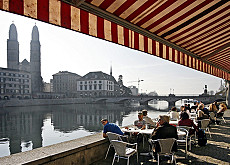Looking up to Angelina Jolie

Social status is becoming increasingly important, even in traditionally egalitarian societies such as Switzerland, a study has found.
But it is not the classic status symbols that people are hankering after. Eco-issues and saving the world – as preached by stars such as Angelina Jolie – are much more in vogue.
The Gottlieb Duttweiler Institute (GDI), a Zurich-based think tank, carried out the survey in Switzerland and Germany and published the results on Monday.
“The Swiss and Germans have grown up with the idea of equal rights and chances for everyone,” GDI’s head of research, Karin Frick, told swissinfo. “They have a less distinct status consciousness compared with Britain, the United States, or France.”
However, the situation appears to be changing, with a large majority of those surveyed confirming that status had become more important and that it would continue to dominate in the future.
But people were found to be “envious” of rather different status symbols than 20 years ago.
“Health was found to be at the top of the list of important status symbols, as well as abilities and language skills. A happy family life and partnership were also high up. Things like a good income and a nice car came in position seven,” explained Frick.
This, the GDI believes, is because people are no longer differentiated by classic status symbols. Designer clothes can be bought at the high street clothing chain H&M, for example.
Values, such as good health, are strongly associated with the rich and beautiful. But this is not all.
Angelina & Co.
“What we also see is that when the super rich want to distinguish themselves and do something for their reputation, they protect the environment or get involved in fair trade,” Frick said.
“See all the stars who lobby for the developing world, who adopt children from there,” she added.
Recent high-profile cases include actress Angelina Jolie who has three children from Asia and Africa, as well as singer Madonna, who has a son from Malawi.
“To gain respect now one has to give something back to the world,” observed Frick.
This increases pressure because people are no longer just trying to keep up with the Joneses, but the Jolies as well, according to the survey.
Stress levels rise further when people start to feel unsure about their status. Particularly affected are the middle classes.
“Increasingly middle class children are being sent to private schools, and this is a new thing in Switzerland and Germany,” Frick told swissinfo.
Status discrimination
However, more focus on status means more discrimination as well, says the GDI study. Around 50 years ago the term “jetset” applied to the super rich who could afford air travel.
Nowadays a flight might cost as much as the taxi to the airport, said Frick. The result: companies look for new ways to become more exclusive, such as VIP airport lounges or limited edition products.
This practice is “not without its dangers”, warned the authors, in a society that still values fairness and sustainability.
Although the two countries surveyed were very similar in outlook, the Swiss were found to be slightly less interested in showy status symbols, such as cars and income, than the Germans.
Indeed, visitors to Switzerland are often struck by its modest display of wealth – despite it being one of the richest countries in the world.
Frick says the Swiss go for understatement. As there is no aristocracy, democracy is in Swiss genes, she adds.
“There’s a levelling because Switzerland doesn’t like anyone who stands out too much,” Frick said.
swissinfo, Isobel Leybold-Johnson
Gottlieb Duttweiler (1888-1962), founder of Switzerland’s largest retailer Migros, shaped Swiss economic history with his bold ideas and a strong sense of social responsibility.
He laid the foundations for the GDI in 1962, with the purpose of building up an independent research institute for economic and social studies.
There is an annual Gottlieb Duttweiler prize. This year it will go to former United Nations Secretary General Kofi Annan. It will be presented in September.
Status has also been considered by Swiss-born philosopher Alain de Botton, in his best-selling book “Status Anxiety”. The subject is our desire to climb the social ladder and our worries about what others think of us.
De Botton, who now lives in London, says that this anxiety is an inevitable side effect of a democratic and ostensibly egalitarian society.
He argues that the solutions are to be found in the arts and philosophy, religion or simply by adopting a Bohemian lifestyle.

In compliance with the JTI standards
More: SWI swissinfo.ch certified by the Journalism Trust Initiative












You can find an overview of ongoing debates with our journalists here . Please join us!
If you want to start a conversation about a topic raised in this article or want to report factual errors, email us at english@swissinfo.ch.